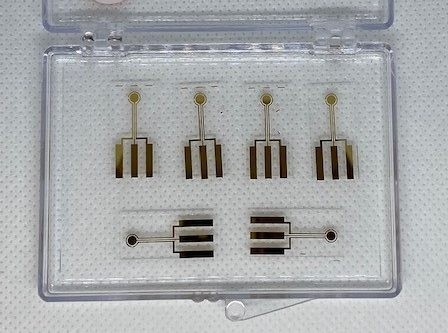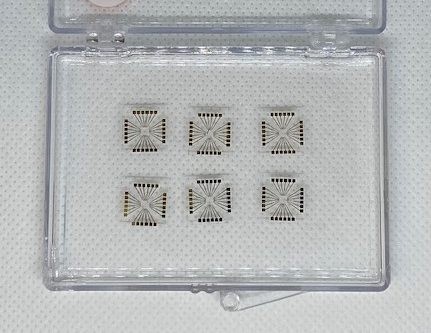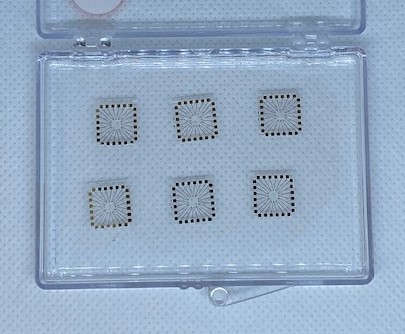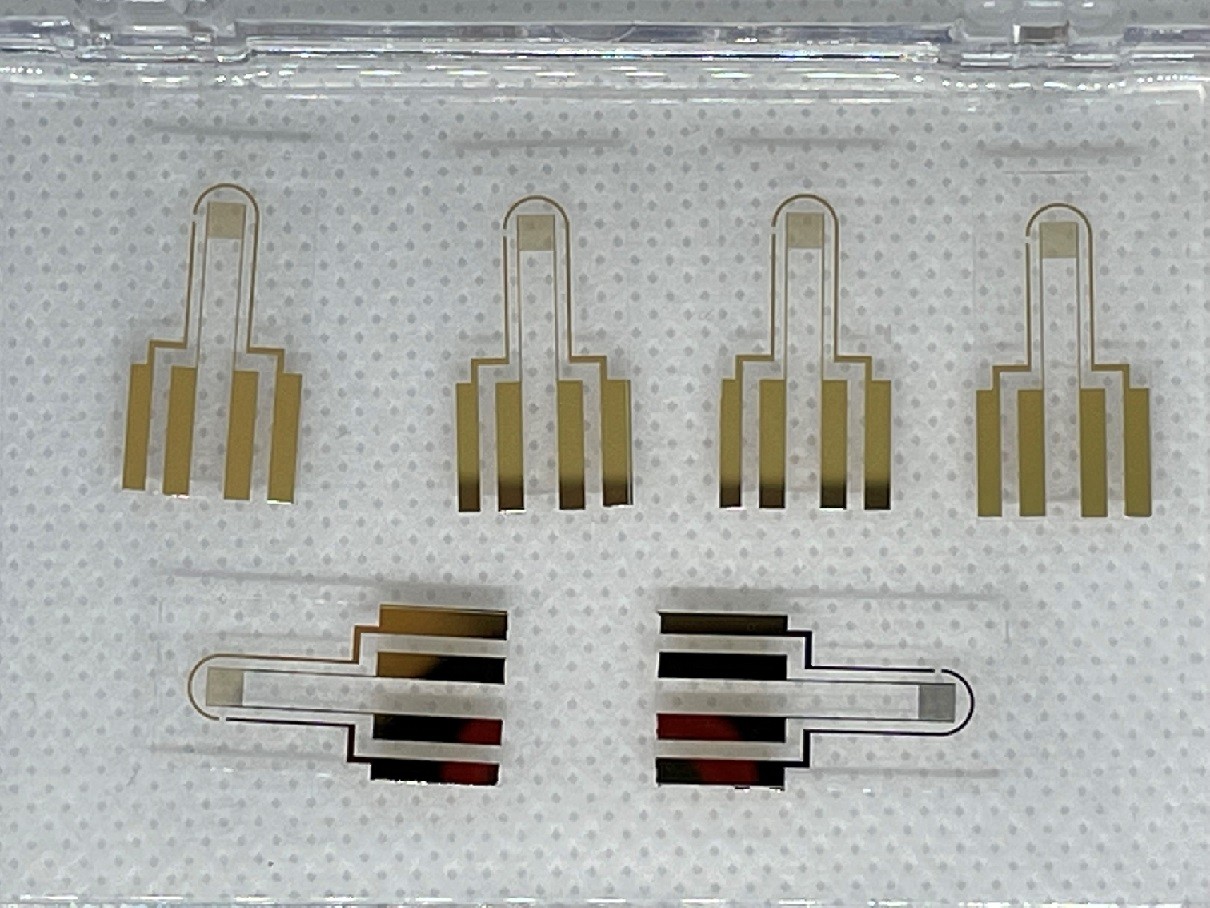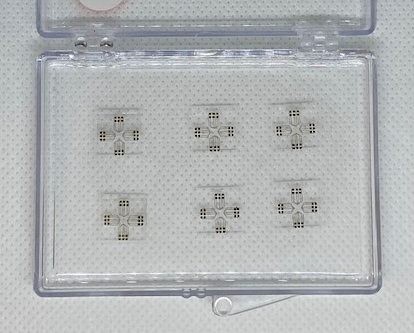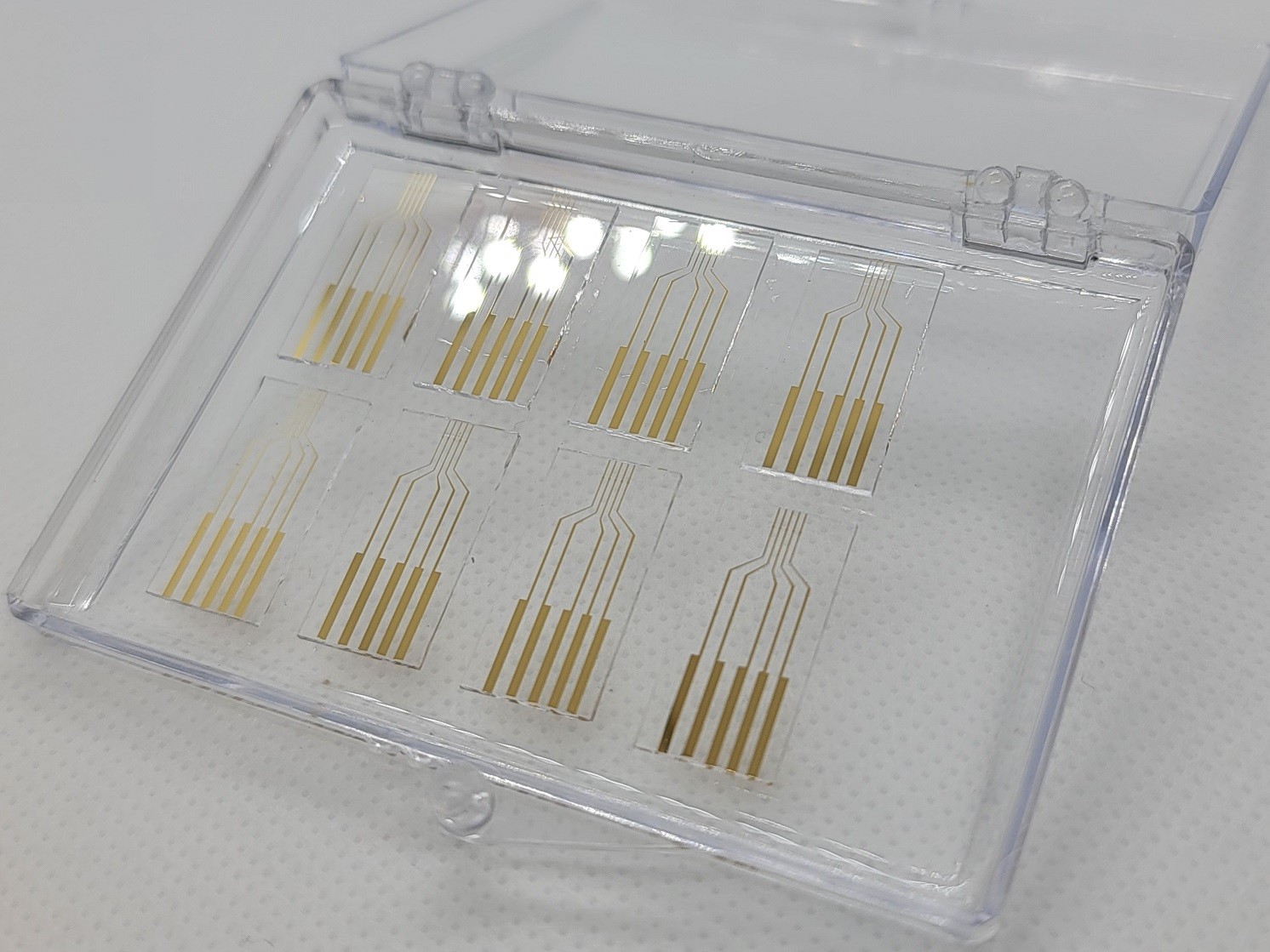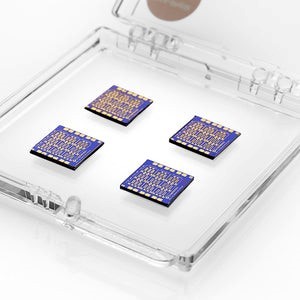Patterned electrodes

Patterned electrodes refer to a type of electrode design used in various applications, especially in electronics and electrochemical devices. These electrodes are designed with specific patterns or shapes to enhance their performance, functionality, or to tailor their interactions with the surrounding environment. They can be made from a wide range of materials, such as metals, metal oxides, conductive polymers, or carbon-based materials like graphene.
Types of Patterned Electrodes
Patterned electrodes come in various forms, each tailored to specific applications and requirements.
Patterned electrodes are diverse in form and application, catering to specific needs:
Interdigitated
Electrodes (IDEs): Ideal for sensing, IDEs have
alternating fingers of conductive materials, offering high sensitivity in
biosensors and gas sensors.
Screen-Printed
Electrodes (SPEs): Affordable and disposable, SPEs
find use in electrochemical sensors and medical diagnostics.
Ring-Disk
Electrodes (RDEs): Essential for studying
electrode reactions, RDEs control mass transport conditions in electrochemical
studies.
Comb Electrodes: Used in capacitive sensing and MEMS, comb electrodes have
finger-like projections extending from a common base.
Microelectrode
Arrays (MEAs): MEAs with micrometer-sized
electrodes are valuable in neuroscience for recording neural signals.
Printed Circuit
Board (PCB) Electrodes: Complex patterned
electrodes on PCBs are common in electronics, like touch-sensitive displays.
Nanoelectrodes: With nanometer-scale dimensions, nanoelectrodes are utilized in
nanoelectronics and single-molecule studies.
Patterned Carbon
Nanotube (CNT) Electrodes: CNT electrodes boast
excellent electrical conductivity and are used in sensing and energy storage.
Patterned Graphene
Electrodes: Similar to CNT electrodes, graphene
electrodes offer high surface area, making them suitable for sensors and
supercapacitors.
The selection of patterned electrode
depends on application requirements, sensitivity, cost, and manufacturing
feasibility.
Each type of patterned electrode has its
unique advantages and limitations, making it suitable for specific
applications. The choice of the electrode type depends on factors such as the
intended application, required sensitivity, cost considerations, and
manufacturing techniques.
Disk Electrodes
The disk electrode chip is indeed
well-suited for electrochemical experiments, particularly for conducting
Electrochemical Impedance Spectroscopy (EIS) and Cyclic Voltammetry (CV)
measurements on solutions and droplets. Its specific design and dimensions make
it suitable for various applications, research, and practical uses.
The disk electrode chip features a 2 mm
center working electrode for electrochemical reactions, with side electrodes
serving as auxiliary/reference. It enables Electrochemical Impedance
Spectroscopy (EIS) and Cyclic Voltammetry (CV) measurements. Compact (1 cm x 2
cm) for portable/lab-on-a-chip applications. Applications include
electrochemical studies, biosensors, environmental monitoring, and
lab-on-a-chip devices. Offers high sensitivity and precise measurements for
versatile electrochemical applications.
A FET (Field-Effect Transistor) electrode
is a microscale sensor that integrates an electrode with a field-effect
transistor. It enables highly sensitive, label-free, and real-time detection of
electrochemical reactions. Applications include medical diagnostics,
environmental monitoring, neuroscience research, drug development, and food
safety analysis. Versatile and powerful for various electrochemical sensing
applications.
Key features of this FET electrode:
FET Configuration:
Uses a semiconductor channel and sample solution
as the gate, detecting changes in electrical characteristics due to sample
composition.
Microscale
Dimensions: Fingers measure 20 µm x 100 µm with
20 µm spacing, providing high sensitivity and resolution.
Chip Size: Compact at 1 cm x 1 cm, suitable for portable and lab-on-a-chip
applications.
Liquid-Based Sample Analysis: Designed for
analyzing liquid solutions, detecting analytes and biomolecules.
Applications of this FET electrode can include:
Chemical and
Biosensing: Detects analytes and pollutants in
liquid samples.
Medical
Diagnostics: Analyzes biological fluids for
disease markers and drug monitoring.
Environmental
Monitoring: Quantifies contaminants in water,
air, and soil.
Lab-on-a-Chip
Devices: Enables integration into portable
analytical devices.
FET 20 Electrode
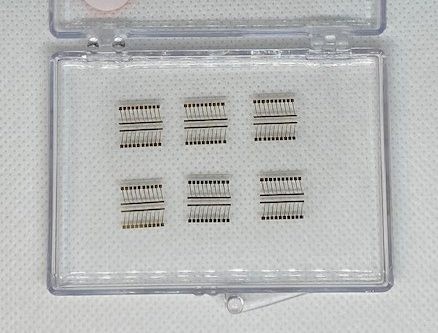
The FET 20 Electrode is a versatile Field
Effect Transistor (FET) electrode designed for liquid-based solution analysis.
With 20 individual electrodes, it enables high-throughput screening and
parallel experiments. Its compact size (1 cm x 1 cm) allows easy integration
into lab-on-a-chip devices. Ideal for bio sensing, chemical analysis,
environmental monitoring, and material science. Customizable for specific
research needs. A powerful tool for advancing scientific research and
innovative sensing solutions.
FET 4 Electrode
The FET 4 Electrode is a versatile Field
Effect Transistor (FET) electrode with four individual electrodes, suitable for
analyzing liquid-based solutions. Its compact size (1 cm x 1 cm) allows
integration into lab-on-a-chip devices. Ideal for biosensing, chemical
analysis, and material characterization. Customizable for specific research
needs. A powerful tool for studying electrical properties and interactions in
various applications.
An interdigitated electrode (IDE) is a
unique electrode configuration widely employed in sensing and electrochemical
applications. The term "interdigitated" describes the pattern of its
electrode fingers, resembling the interlocking fingers of two hands. The IDE
consists of alternating and overlapping conductive fingers, typically made of
metals or metal alloys, on a substrate. This arrangement increases the
electrode's surface area, allowing for enhanced sensitivity and efficient
charge transfer during electrochemical reactions.
Key characteristics of interdigitated electrodes:
Finger
Arrangement: Consist of two sets of interleaved
fingers serving as working and counter electrodes.
High Surface Area: Larger surface area enhances sensitivity and interaction with
analytes.
Reduced
Resistance: Close proximity of fingers reduces
lead resistance for accurate measurements.
Applications: Used in chemical and biosensors, impedance spectroscopy,
microfluidic devices, energy storage, environmental monitoring, and biomedical
research.
IDEs are versatile tools enabling sensitive
and efficient detection and measurement of electrical and electrochemical
properties in various fields of research and technology.
Overall, interdigitated electrodes offer a
versatile platform for a wide range of sensing and electrochemical
applications. Their unique design, high surface area, and compatibility with
microfabrication techniques make them valuable tools in research, industry, and
various emerging technologies.
Interdigitated Electrode Array
The Interdigitated Electrode (IDE) Array is
a highly versatile and powerful tool used for conducting a wide range of
electrochemical measurements, with a particular focus on resistance and
capacitance measurements in liquid samples. Its design consists of multiple
sets of interleaved electrodes, creating an array format. This configuration
enhances the electrode's surface area and enables simultaneous analysis of
multiple liquid samples, making it ideal for high-throughput screening and
parallel experiments.
The Interdigitated Electrode (IDE) with Pad
The Interdigitated Electrode (IDE) with Pad
is a unique and specialized configuration of the traditional IDE, enhanced with
additional features to facilitate a wide range of sensing, electrochemical, and
impedance spectroscopy applications. This specialized design includes a central
pad in addition to the interdigitated fingers, providing further versatility in
conducting sensitive and precise measurements on liquid samples.
Interdigitated Electrode (IDE)
The Interdigitated Electrode (IDE) is a
highly effective and versatile electrode configuration specifically designed
for various sensing applications, with a strong emphasis on chemical and
biosensing. The key advantage of the IDE lies in its unique arrangement, which
includes both reference and auxiliary electrodes in addition to the main
interdigitated fingers. This configuration allows for precise and accurate
electrochemical measurements, making it a powerful tool for different types of
analyses.
Padded Electrode
A "Padded Electrode" is an
electrode design featuring an additional area or "pad" on its
surface, serving specific functionalities or enhancing its performance in
various applications. The pad is tailored to suit the requirements of
electrochemical experiments, sensing, and related fields, providing researchers
with a versatile tool for precise measurements and targeted interactions with
liquid samples.
Padded electrodes feature a separate functionalized pad on the electrode surface, enhancing sensitivity and enabling targeted detection.
Key features and applications include:
Functionality: Pad allows functionalization with sensing materials or biomolecules
for targeted detection in bio sensing applications.
Enhanced
Sensitivity: Increased surface area leads to
higher sensitivity in electrochemical measurements and sensing.
Customization: Flexible design allows tailoring to specific experimental needs.
Electrochemical
Measurements: Suitable for cyclic voltammetry,
impedance spectroscopy, and chronoamperometry.
Biosensing: Detects biomolecular interactions like antigen-antibody binding or
DNA hybridization.
Medical
Diagnostics: Used in disease marker analysis and
biomolecule detection.
Lab-on-a-Chip
Devices: Ideal for point-of-care testing and
miniaturized analytical platforms.
Padded electrodes offer a versatile and
efficient platform for various electrochemical experiments and sensing
applications, benefiting research, industry, and biomedical fields.
Multi-Pad Electrode
The Multi-Pad Electrode is a versatile
platform with 10 square pads (100 µm x 100 µm) for multiple sensing and
analysis on a single chip. It suits protein analysis, DNA sequencing,
cell-based research, and biosensor development. Spacing of 130 µm prevents
cross-talk. The compact chip (1 cm x 1 cm) enables portable and high-throughput
experiments. Valuable for real-time cell behavior, label-free protein analysis,
drug screening, and high-sensitivity DNA sequencing. Ideal for lab-on-a-chip
applications and diverse biological research.
Interdigitated Electrode with Pad
Interdigitated Electrode with Pad is a
versatile platform for sensing, electrochemical, and impedance spectroscopy
applications. IDE design (50 µm width/spacing) ensures high sensitivity and
precise measurements. Pad functionality allows targeted detection with specific
biomolecules. Compact chip (1 cm x 2 cm) enables portable experiments. Valuable
for chemical and biosensing, impedance spectroscopy, and lab-on-a-chip
integration. Offers flexibility and efficiency for diverse research and
biomedical applications.
Probe Electrodes
Probe electrodes are specialized electrodes
designed for precise and localized measurements in scientific and engineering
applications. Their small tips or sharp points enable access to specific
locations and provide high spatial resolution data. These electrodes find
widespread use in electrochemistry, neuroscience, materials science, and
nanotechnology.
Probe electrodes are specialized tools with small tips or sharp points, providing high spatial resolution measurements.
They find applications in various fields:
High Spatial
Resolution: Probe electrodes enable localized
data collection with high precision, crucial for understanding complex systems.
Electrochemical
Studies: In electrochemistry, they investigate
reactions, kinetics, and behavior at interfaces with exceptional resolution.
Scanning Probe
Microscopy: Used in techniques like STM and AFM
to image and manipulate surfaces at atomic and molecular scales.
Neuroscience
Research: Probe electrodes, including MEAs,
record electrical signals from neurons, advancing brain function studies.
Materials
Characterization: They analyze electrical
properties at the nanoscale, measuring conductivity and resistivity.
Nanotechnology: Employed for nanomaterial manipulation and characterization,
driving advancements in nanoscience.
Electrochemical
Microfabrication: Used to create precise micro
and nanostructures on surfaces.
Sensing and
Biosensing: Functionalized with sensing
materials or biomolecules for targeted analyte detection.
Materials and designs of probe electrodes
can vary, with common choices being platinum, gold, silicon, and carbon-based
materials.
Overall, probe electrodes are valuable
tools, enabling localized and high-resolution measurements across diverse
scientific and engineering fields, uncovering intricate phenomena and advancing
research and technology.
Six Probe Electrode
The six-probe electrode design features an
array of six working electrodes with different electrode gap distances,
enhancing sensitivity and signal amplification. It enables simultaneous
monitoring of multiple redox reactions, making it valuable for various electrochemical
studies, sensor development, and high-throughput screening. With compact chip
dimensions, it is suitable for lab-on-a-chip devices, providing a powerful
platform for diverse applications in research, industry, and biomedicine.
Five Probe Electrodes
The five-probe electrode is a specialized
micro-electrode setup for measuring sheet resistance, impedance, or
conductivity in diverse materials, including 2D materials, polymers, and
biological tissues. Its "Kelvin method" configuration ensures
accuracy by reducing lead resistance impact. With a large gap distance and
versatile applications, it offers a powerful tool for materials
characterization, biomedical research, and electrical property studies. The
compact chip size makes it easy to integrate into experimental setups for
various research and industry applications.
Four Probe Electrode
The four-probe electrode is a specialized
array designed for precise testing of 2D materials like graphene and carbon
nanotubes. Its unique configuration allows for accurate conductivity
measurements with reduced contact resistance effects. With twelve sets of electrodes
on a compact chip, it enables high-throughput testing and characterizes the
electrical properties of nanoscale materials. Valuable in nanoelectronics and
nanotechnology research, it offers a powerful tool for studying electronic
transport phenomena and quality control in 2D material applications.

The three-probe microelectrode chip is a
specialized platform for designing and testing chemical sensors and
transistors. With three microelectrodes and a transparent substrate, it allows
for electrical and optical sensing, making it ideal for various applications in
chemical and biosensors. The gold electrodes provide high electrical
conductivity for precise measurements, while its compact size enables
integration into lab-on-a-chip devices for analytical and diagnostic purposes.
Valuable in research and biomedical fields, it offers a powerful tool for
studying chemical reactions and biomolecular interactions.
Sensing Device
A sensing device, in the context of
patterned electrodes, utilizes specialized electrode configurations to enhance
performance in detecting and measuring physical, chemical, or biological
properties. Patterned electrodes, with specific shapes and materials, offer
improved sensitivity, selectivity, and spatial resolution, leading to better
detection limits.Examples of sensing devices using patterned electrodes include
chemical sensors, where functionalized electrodes detect and quantify specific
analytes. Biosensors use immobilized biomolecules to measure biological
interactions. Impedance spectroscopy sensors study electrical properties across
frequencies, while gas
sensors detect gases and VOCs.
Environmental sensors monitor parameters like humidity and air quality.
Electrochemical sensors offer precise measurements of electroactive species.
Patterned electrodes are valuable in
lab-on-a-chip devices, creating microfluidic systems for rapid and miniaturized
sensing applications. Their customizable patterns optimize sensing performance
for different scientific, industrial, and biomedical fields, making them
versatile platforms for advanced sensing technologies.
Click
here to learn more about Patterned
Electrodes .
Recent Posts
Cokion
Cokion Private Limited is an Indian multinational technology company focusing on e-commerce, technology services, online advertising & marketing, headquartered in Bengaluru, Karnataka, India. It has its subsidiary, Cokion Inc., headquartered in Albany, New York, USA.
Welcome to Cokion com., the ultimate online shopping destination tailored for the diverse needs of consumers across the world. At Cokion.com, we pride ourselves on providing a seamless and enjoyable e-commerce experience, offering a wide range of products and services to meet the unique preferences of our customers.
Key Features:
Extensive Product Selection: Discover a vast array of products ranging from electronics and fashion to home goods and more. Cokion.com curates a diverse collection to cater to every aspect of your lifestyle.
User-Friendly Interface: Our intuitive and user-friendly platform ensures a smooth navigation experience. Effortlessly browse through categories, find detailed product information, and enjoy a hassle-free shopping journey.
Secure Transactions: Your security is our priority. Cokion.com employs state-of-the-art encryption and security measures to safeguard your personal information and facilitate secure transactions.
Fast and Reliable Delivery: Enjoy prompt and reliable delivery services across the world. Cokion.com. is committed to ensuring your purchases reach you in a timely manner, enhancing your overall satisfaction.
Responsive Customer Support: Our dedicated customer support team is ready to assist you with any inquiries or concerns. Reach out to us via various channels, and we'll strive to provide swift and effective solutions.
Exclusive Deals and Promotions: Benefit from exciting promotions, discounts, and exclusive deals regularly offered on Cokion.com. Save more while enjoying the quality and convenience of our e-commerce platform.
Mission Statement:
At Cokion.com, our mission is to redefine the online shopping experience for our customers. We aim to become the go-to destination for individuals seeking quality products, exceptional service, and a platform that understands and meets your evolving needs.
